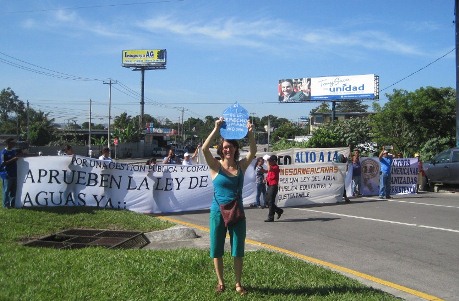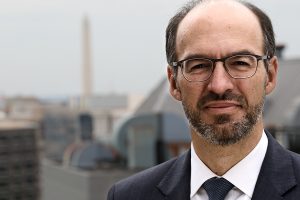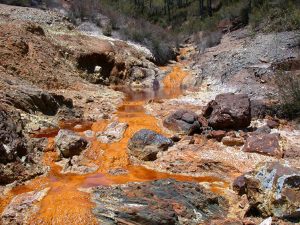Defending Natural Resources, Online Resources
Tired of Waiting for a Law to Protect their Water, Salvadorans Take to the Streets
By Alexandra Early
The Salvadoran people have been waiting for seven years for the Legislative Assembly to pass a comprehensive law to protect their right to safe and clean water. In July they decided they are done waiting and staged a series of rallies, road blocks and press conferences to pressure the legislature to pass the law. The water law, which the social movement proposed in 2006, would define water as a public good and a human right and protect it from privatization and pollution.
During the July actions the Water Forum (Foro del Agua), a broad coalition of labor, women’s rights, and rural organizations, not only demanded the approval of the Water Law but denounced those responsible for the horrific state of El Salvador’s water. Figures vary, but studies confirm that El Salvador’s superficial water, the source of most drinking water, is extremely polluted. 20% of the total population doesn’t have access to home water connections and 60% of the rural population lacks this access. This problem is a result of the neglect of past right wing, pro-corporation governments who weren’t interested in protecting the country’s water sources or expand access to water services.
On July 17th, community members protested in the town of Nejapa, outside of San Salvador, where the transnational company Sab Miller wants to expand its water bottling operations and extract more water from the already strained hydrological resources that provide drinking water for the San Salvador metropolitan area. In the eyes of the Water Forum this proposed expansion, is another example of the way private businesses want use the country’s water for profit, despite the damage this causes local communities.
The next day, folks from the organized communities of La Libertad blocked the two lane highway that connects San Salvador to the port and beaches of La Libertad and to the many wealthy housing complexes in between that have cropped up in recent years. Access to clean water is a big problem in this area, where housing complexes are built without taking into account how they might pollute the nearby rivers and affect the poorer communities downstream.
Yale University researcher Beth Tellman has been working with CRIPDES and their partner organization ACUA studying the effects of this uncontrolled development on the area’s rivers. Tellman says, “these fancy developments are granted permission to cut down trees and get access to water that the poorer communities here have been trying to get for decades. And they are polluting the rivers were people downstream get their water for cooking, cleaning and drinking. They are dumping their sewage directly into these rivers.”
Communities in La Libertad have formed an alliance called the Committee for the Rescue of the River Basins of La Libertad (CORCULL) to fight for their access to water and the protection of local rivers. CORCULL has held community trainings about the protection of water –including a training in June for the Sister Cities supported scholarship students of Cripdes Sur– and they have been able to halt some constructions in the area. The mayor of Nuevo Cuscatlan, La Libertad, has also been in the news recently for standing up to one of these real estate developers and fining the company one million dollars for cutting down hundreds of trees, in violation of the municipality’s environmental ordinances. Unfortunately, Nuevo Cuscatlan is one of the few municipalities in the area with these kind of strict environmental protections.
Folks also rallied in front of the Salvadoran Chamber of Commerce, the National Association of Private Business (ANEP). The ANEP is widely recognized to be behind the pro-privatization water bill that right wing representatives introduced in March. According to the environmentalist Angel Ibarra, the ARENA-ANEP “water privatization law” goes by this essential principle “whoever has money buys water and the companies that can expropriate the people’s water profit from that water.” At the July 15th protest, community members from around the country presented the business association with jugs full of water from the Acelhuate river, El Salvador’s dirtiest rivers, polluted as it is by factories on the outskirts of the capital owned by upstanding businessmen of ANEP.
The Water Forum held three more protests in the departments of Chalatengango, San Salvador and La Paz in July. The communities of Chalatenango have good reason to be worried about their water because the mountains of the department have been the targets of North American gold mining companies since the early 2000s. Folks in Chalatenango have developed a strong resistance to mining by educating community leaders on what mining would to do the area’s water, land and agriculture. The National Roundtable against Mining, in addition to pushing for a law bannin metallic mining, has also been supporting the passage of the General Water Law because it would prevent the kind of pollution and excessive water use necessary for gold mining. On August 22nd the Water Forum is planning another larger protest and calling for thousands of people from around the country to converge on San Salvador and demand the immediate passage of the General Water Law.
Read more background about the water law
“¿Por qué no se aprueba el anteproyecto de una ley de agua?”
Check out a video of the protest in Nejapa and more photos and videos on the Foro del Agua website




